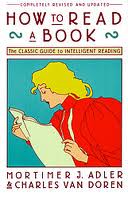The first task before you is to build a mind that can think well. This does not require much more than hard work and the right path. Contrary to what some believe, anyone can become a better thinker. Most of what is needed is found in everyday life. There are at least three aspects of building your mind into a lean, mean thinking machine: working with others, working on your own, and making sure you are “feeding” your mind. In the world of physical training, this is analogous to playing ball with some friends (working with others), running on the treadmill (working on your own), and watching what you eat (feeding your mind). We will start with individual training—things you can do on your own.
Reading
Reading is as fundamental to good thinking as running is to physical conditioning. The thinking mind must read regularly. However, not all reading is created equal. Many think of reading simply as the act of decoding words on a page, but for use in building your mind, reading must go far beyond this. Not all written work needs the same level of reading intensity, and we tend to read at one of three levels, each of which has its own uses.
Level One: Skimming
First is the level of survey reading, or skimming. Some have tried to reject this as a form of reading, but it can be valuable. Having a system for skimming can greatly increase your ability to read a work “on the surface.” Sometimes this is all that a work requires of us, or all that we have time for if we are facing a deadline. There are some quick tips that can make this level of reading a skill worth using. Let’s discuss a few of the basics.
Skimming is when you try to ascertain the basic points of an author’s work without having to read it word-for-word. This level demands that you learn to categorize and recognize the main points of something you are reading. The best place to start is the Table of Contents, if the work has one. This allows you to quickly survey the overall argument of the work, if the author has revealed such with his chapter titles. You can move from there to the introduction of the work. Here, the author should reveal his main idea and how he intends to develop it. Then, believe it or not, the best place to look is the back of the book. Go to the final chapter and the final paragraphs, to see how he summarizes his work.
Now you are prepared to skim. Move through the pages of each chapter in order, but allow your eyes only to consider the start of each paragraph, looking for the main ideas. Many authors today help by providing sub-headings and bold words. Use them! A great way to keep yourself moving is to mark the book as you skim it, highlighting or underlining the key points as you find them. Again, you are not seeking to absorb everything in the book, but only its main points.
Once you have skimmed in this way, you should force yourself to pause and review the main points of the work. It may be helpful to make an outline, in case you want to return later to read it more deeply, or if you will use the work later and don’t want to repeat the skimming process.
Level Two: Analytic Reading
The second level of reading occurs when you and the author enter into a dialogue. Here you will read the work word for word, or at least the sections important to you. You are seeking to understand each part of the author’s whole point. Skimming before entering this level can be helpful, as it allows you to enter the dialogue better informed. If you think of this level as having a conversation with the author, then you will probably intuit your way to the method. Basically there are two things you need to do: ask questions and argue.
No matter what non-fiction work you are reading, you should always be asking the author questions. The three basic questions found throughout this course are excellent ones to use here:
- “What do you mean by that?”
- “How do you know that?”
- “How does this change things, and what if you are wrong?”
Often you will find that the questions you ask are answered a few sentences or paragraphs later, but sometimes the author will not address your question. This then becomes something you have to answer on your own: your interpretation of his thought. By asking the questions, you are engaging with the author’s thoughts, and this builds your own mind.
Often as you ask the author questions, you will not agree with his answers. In fact, if you usually do agree with everything you read, you may not be asking enough questions. Debate and argument are key ingredients in thinking through an issue and in training our minds to be stronger. Just because the author is not present in the room does not mean you can’t argue with his ideas. You may have to provide both sides of the argument, but often you will find the author holding his own. The key here is honest argument. You have to be willing to go where the truth leads you. The author may be wrong, but you have to see his error, not simply turn him off because you don’t agree. Otherwise, it might be you who is in the wrong.
Level Three: Synthetic Reading
We now come to the highest and most difficult level of reading. While much of your reading in college is assigned to you by the professor, remember that it is your education (your mind) that is being built. You don’t have to limit yourself to the professor’s reading list. Your mind is made much stronger and “larger” when you read several books on a given subject. This gives your mind material to compare. And comparison is one of the greatest acts of education. This level simply calls for you to repeat the previous two levels of reading but with several books on the same subject.
Let’s say you wish to understand the historic and complex figure of Abraham Lincoln. Obviously, and especially if time is limited, you could simply skim an article online and call it done. But note two things: 1) you only skim read without entering into thoughtful analysis, and 2) you only skim read one person’s work on Lincoln. Even if you picked up one book on Lincoln and read it at the second or analytic level, #2 above would still be true. The deepest levels of understanding come when you skim and analyze several works on Lincoln, purposefully choosing a variety of viewpoints—perhaps one by someone who lived during his time and another that is fairly recent. One should probably be by someone representing the North’s perspective and another the South’s. And so on. As you read these books, you find that each author starts arguing with the other books you have read.
Let me repeat that not every book you pick up needs or deserves all three levels of reading. The more worthy the material you select, the better built your mind will become. And just like a physical workout, don’t just exercise one area of your mind. Be diverse in subject matter. Press your mind to think about things and areas of life that are new, or perhaps less interesting to you. One young man walked into a course on archaeology because it was the only course offered that fit his elective requirements and his schedule. He came in almost determined to be bored, as such a subject sounded dusty and old. Within a week he was subscribing to a magazine on the subject and discussing with everyone his new passion. Such conversions have been known to happen, so read broadly.












